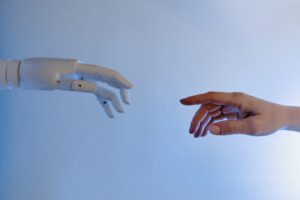
Augmented Intelligence (AI) is more often defined as a combination of a human-centred partnership model and artificial intelligence, working together to enhance cognitive performance and aid in the decision-making process.
In the digital marketing space, so often a step ahead, AI offers a chance to make more accurate data-driven decisions that take place in science and tackle more aspects of everyday life, including business and campaigns. The market is therefore projected to grow to $121.57 billion by 2030.
In addition, recent studies focusing on the latest developments in technology have found that in the digital era there is an increased demand for augmented intelligence as it is estimated to grow to $29.19 billion by 2027 and reach over 14 billion dollars in 2022.
During the Skills Summit 2022 conference in Zurich, the debate explained that more than 60% of activities and jobs have a rate of 30% of automatable tasks, which has become a straight-hand example for fashion industries, web design and developers, stock clerks, sewing machine operators, dental labs, and engineers.
A subsequent study conducted by IZA and Terry Gregory, in collaboration with the Utrecht University IAB, discovered that augmented intelligence tools have grown in scope, allowing new insights to emerge from new systems that may penetrate all sectors in the coming years.
The balance of the skills most needed leans towards cognitive, socio-emotional, and technological impact:
A survey from the US has established that by 2030 there will be a significant change in the extent to which certain skills are used at work. It is estimated that almost 60% of working hours will rely on the use of technological and socio-emotional skills rather than physical and manual skills.
The DELTA’s distinctive attributes that thrive in the future will enable citizens to constantly learn new ways to find more dynamic digital and automated labour segments in the market. Thus, the key elements were identified as an increase in adaptability to the digital environment.
To determine human qualities most researched in jobs, there were 56 key segments broken down into 4 macro-categories and 13 groups that are more concentrated on soft skills, such as critical thinking, mental flexibility, self-awareness management, and goal achievement.
What kinds of skills will future jobs require?
Across the skill groups, the main gap still consisted of finding the desired level of proficiency and determining which areas are more concerning, besides the planning process of working, which may differ from one another. Therefore, the highest scores were registered in leadership and self-awareness management.
The survey suggests that the main impact of AI and digital is to increase critical enabling and continuous adapting growth, which further demands an increase in predictable tasks and focuses on specific skills in every career change process.
How do workers adjust when technology comes into play at any firm/company?
The promise of new technology, including robots and artificial intelligence, could be a new resolution in the matter of productivity and economic growth, maximising time management and growing safety issues, although these shifts may cause a challenge for employees.
The breakthrough is shifted by numerous gaps in the quality of engagement with the new planned technology because many users are still coping with certain difficulties in adapting to new ways of work. Therefore the main efforts are focused on finding new ways to close gaps by trying to reskill workers to fulfil action effectiveness.
Besides the apparent enthusiasm for prosperity in the market, there is more work to do with the methods of constant learning, this means that higher cognitive skills will play an important role in the process.
Another factor getting in the way is the pre-conception of the worker’s beliefs about the technology in use. This might cause more anxiety, especially if it is more tech-savvy and decision-based. However, algorithms are not a new concept in the actuality of work.
People might be at ease with the optimization process. A recent study case performed by McKinsey showed that algorithms and artificial intelligence will shape the future by adopting more automatized functions and tools that will boost strategy plans and make numerous efforts to internalize costs and benefits.
To embrace the acceptance of performant machines and robots, there is still a long way to go in testing areas, to assure a higher performance in more domains.
Carina Schuster is a multilingual tech and science editor for The London Financial & a podcast anchor and producer for SciTech Suisse, covering groundbreaking stories in the matter of disruptive technology developments and interviewing top experts in AI, the Metaverse, Web3, Blockchain and scientific research. Throughout her experience as a journalist in the editorial and digital worlds, she was selected by CNN Money Switzerland in 2020 as a digital producer intern and has demonstrated a collaborative and creative spirit, working alongside talented journalists and delivering impactful stories with the main aim of simplifying the complexity of technology.
